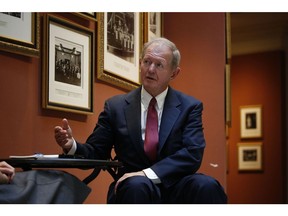[ad_1]
Swedish business leader Marcus Wallenberg said companies and governments must adapt to a “completely new world order,” in which tension between China and the US has driven western countries to pour billions of public dollars into clean-energy industries.

Article content
(Bloomberg) — Swedish business leader Marcus Wallenberg said companies and governments must adapt to a “completely new world order,” in which tension between China and the US has driven western countries to pour billions of public dollars into clean-energy industries.
While the chair of Wallenberg Investments AB described himself as a free trader at heart, he said the current geopolitical circumstances have forced everyone to adapt and recognize the need for investment in the sectors of the future.
Advertisement 2
Article content
Article content
“You have to realize that going through this green transition, we will have to spend a lot of dollars to make that happen,” Wallenberg said in an interview with Bloomberg in Ottawa, shortly after he and a Swedish business delegation met with Canadian Prime Minister Justin Trudeau.
“Whether it’s going to be in R&D or whether it’s going to be financing big infrastructure projects, it will not be possible in my mind only doing it from one party. You’ll have to have cooperation between business and government. I think it’s going to be a prerequisite in one way or another. And then you can debate what is the right way of doing it.”
Wallenberg, a fifth-generation member of the prominent Swedish business family, led representatives from the investment, manufacturing, telecommunications and other sectors to Canada’s capital, including FAM AB, Atlas Copco AB, Epiroc AB, Saab AB, Ericsson AB, Stora Enso Oyj, GreenIron H2 AB and Navistar Inc. Trudeau has enthusiastically embraced the US-led push to topple China’s dominance in clean energy sectors, and recently pledged as much as $5 billion in public money to Sweden’s Northvolt AB to build a battery plant in Quebec.
Article content
Advertisement 3
Article content
The Covid-19 pandemic taught countries that completelyh relying on global supply chains is not as safe as once thought, Wallenberg said, and President Joe Biden’s Inflation Reduction Act has also really “moved the needle.” The bill set out billions in subsidies for green manufacturing, forcing allies including Canada to match the dollars for global companies or lose out on key investments.
“China has been working very hard on the battery and the EV situation for a long time,” Wallenberg pointed out. “We see that in the new cars that they’re launching and that they’re now spreading around the world that are very competitive price-wise and so on. So it’s obvious that they’ve done their homework also in this space. And we have to learn how to compete.”
European nations are also moving toward having an industrial policy in place one way or another, he said, though debate still rages about subsidies. There are different ways to support industry, he added, noting that in Sweden several projects have been launched due to favorable local conditions and innovation.
In Canada, Wallenberg said he believes there is “so much more to do” to strengthen business ties with Sweden. “You are a high-tech country, you have very skilled labor and skilled companies that can really build on this. And I think the mindset is very much alike,” he said, adding that Canada appears to be moving in the right direction on the climate transition. “Same latitude, same attitudes kind of thing.”
Advertisement 4
Article content
Wallenberg, also chair of FAM AB and Patricia Industries, is involved in banking and finance, defense, private equity and pharmaceuticals as chair of SEB AB and Saab, vice-chair of EQT AB and as a director on AstraZenea Plc’s board. The Wallenbergs’ business dynasty began in 1856 when they founded the bank that became SEB – and he said his family believes in the opportunities presented by the clean-energy shift.
“I happen to believe, my family happens to believe, that for us it’ll be a competitive advantage going that route,” he said. “I think green business is going to be a good business and it’s going to be a competitive advantage. And maybe people don’t see it today, but I think we’ll see it in the years to come.”
Article content
[ad_2]
Source link

Comments
Postmedia is committed to maintaining a lively but civil forum for discussion and encourage all readers to share their views on our articles. Comments may take up to an hour for moderation before appearing on the site. We ask you to keep your comments relevant and respectful. We have enabled email notifications—you will now receive an email if you receive a reply to your comment, there is an update to a comment thread you follow or if a user you follow comments. Visit our Community Guidelines for more information and details on how to adjust your email settings.